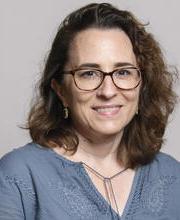Elena Kramer
Interim Director, Harvard University Herbaria, Faculty Fellow of the Arnold Arboretum

Faculty Support: Erin Ciccone
My lab is very broadly interested in the evolution of floral morphology. We use molecular, morphological, and phylogenetic approaches to study how flowers have changed over the course of evolutionary time. Research projects in the lab cover a diverse set of topics, including gene lineage evolution and the effects of gene duplication, the morphological diversification of floral parts such as petals and fruits, and the evolutionary and ecological significance of pollinator interactions. Within this context, one of our major focus areas is the development of Aquilegia (columbine) as a new system for studying evolutionary and ecological questions, but we also work on other diverse lineages, including Loasaceae and Tropaeolum.
Recent Publications
Edwards, M. B., E. S. Ballerini, E. M. Kramer. (2022) Complex developmental and transcriptional dynamics underlie pollinator-driven evolutionary transitions in nectar spur morphology in Aquilegia (columbine). American Journal of Botany, 10.1002/ajb2.16046.
Min, Y., S. J. Conway, E. M. Kramer. (2022) Quantitative live imaging of floral organ initiation and floral meristem termination in Aquilegia. Development, 149, dev200256.
Edwards, M. B., G. P. T. Choi, N. J. Dereig, Y. Min, A. C. Diana, S. A. Hodges, L. Mahadevan, E. M. Kramer, E. S. Ballerini. (2021) Genetic architecture of floral traits in bee- and hummingbird-pollinated sister species of Aquilegia (columbine). Evolution, 75: 2197–2216.
Ballerini, E. S., Y. Min, M. B. Edwards, E. M. Kramer, S. A. Hodges. (2020) POPOVICH, encoding a C2H2-zinc finger transcription factor, plays a central role in the development of a key innovation, floral nectar spurs, in Aquilegia. Proceedings of the National Academy of Science, USA, 117: 22552-22560
Filiault, D. L., E. S. Ballerini, T. Mandáková, G. Aköz, N. J. Derieg, J. Schmutz, J. Jenkins, J. Grimwood, S. Shu, R. D. Hayes, U. Hellsten, K. Barry, J. Yan, S. Mihaltcheva, M. Karafiátová, V. Nizhynska, E. M. Kramer, M. A. Lysak, S. A. Hodges, M. Nordborg. (2018) The Aquilegia genome provides insight into adaptive radiation and reveals an extraordinarily polymorphic chromosome with a unique history. eLife, 10.7554/eLife.36426.
Contact Information
16 Divinity Avenue
Cambridge, MA 02138
